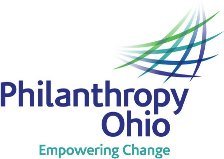Open letter to Ohio’s Congressional delegation
October 30, 2017 at 4:59 pm Philanthropy Ohio Leave a comment
The Honorable Joyce Beatty
U.S. House of Representatives
Washington, DC
Dear Representative Beatty,
As we watch the U.S. Congress move with all due haste toward passing a tax reform bill, Philanthropy Ohio urges you to carefully evaluate proposed reforms’ impact on philanthropy and on the lives of our most vulnerable citizens, those whom our philanthropic dollars serve through our nonprofit partners.
The pending tax debate is critical for the philanthropic sector, as we have witnessed during conversations with Trump Administration officials and congressional staff. Those conversations revealed the widely-held, misguided understanding that Congress can enact severe tax cuts because philanthropy can step in to meet the resulting needs of the underserved. We in philanthropy know this is a fallacy of supreme proportions and we continue to push back on that statement.
For the first time, Philanthropy Ohio is weighing in on tax policies beyond the typical items related to charitable giving; as you well know, we have visited with you and others to advocate for expanding the IRA Charitable Rollover; reducing the private foundation excise tax; and maintaining the full scope and value of the charitable deduction. Those are all important for philanthropy’s continued strength and vitality – but this time we turn our attention as well to a number of other items that help those served by philanthropy, lower- and middle-income individuals and families.

You are familiar with Ohio’s current economic circumstances, where townships and small- to mid-sized legacy cities are experiencing unprecedented financial insecurity. The Ohio United Way’s ALICE® Report (Asset Limited, Income Constrained, Employed) found that in 2015, 14% of Ohio’s households faced financial hardship and an additional 26% (1.2 million households) were identified in the ALICE category. It is this population of Ohioans about whom we are most concerned when we read the tax reform proposals, concluding that they could very well do more harm than good on the lives of those we in the philanthropic sector have the privilege to serve.
Consider, for instance, two tax credits for low- and middle-income workers under debate: the Earned Income Tax Credit (EITC) and the Child Tax Credit (CTC), both of which help individuals and families make ends meet by keeping more of what they earn. The EITC refundable tax credit incentivizes work and depends on a worker’s income, marital status and number of children. In Ohio, 939,000 workers claimed the EITC last year, putting $2.3 billion into Ohio and lifting people out of poverty. The EITC’s power could be increased by extending it to younger adults, parents not living with their children and veterans. Similarly, the CTC should be protected as a refundable credit and considered for expansion to older adults, especially given the number of seniors raising grandchildren as a result of the opiate addiction crisis.
For a working family in Elyria, Ohio, that earns $12 an hour in a local manufacturing plant, living paycheck to paycheck requires vigilance and planning that few of us with privilege understand. Life for many families is wrought with uncertainty, and a tax refund check can mean the difference between eviction or being able to pay for medicine. Both Republicans and Democrats have supported the EITC and current proposals to change these effective policies would push more people in lower- to middle-income brackets into full-blown poverty that will increase demands on philanthropy and nonprofits.

Another set of credits at risk in current debates is also of concern to those of us who look at education as a step out of poverty: the American Opportunity Tax Credit (AOTC) and the Lifetime Learning Credit (LTC), designed to help low and middle class taxpayers afford higher education expenses. The AOTC is the more lucrative of the two as it can provide a family with about $2,500 a year for each eligible student. Foundations know that for many families a $5,000 top-off to a financial aid package can mean a world of difference for a student embarking on a four-year college education or community college. The LTC provides up to $2,000 for qualifying tuition and fees for those who may be older and returning to school to pursue a new career at higher pay. We know from our colleagues in the education sector, the lifetime earnings of a person holding a four-year degree is about $1.9 million, about twice what the typical high school graduate earns, and $335,000 more than what the typical associate degree program graduate earns. Despite this evidence, a 2014 Congressional Budget Office report suggested elimination of these and similar credits to help reduce the deficit. Philanthropic dollars will never be able to make up the difference this reduction would have on this important form of college financial aid.
We are also concerned about the proposal to double the standard deduction, intended to simplify the tax code by reducing the number of itemizers by 95%. In Ohio, that would mean 1.25 million fewer itemized returns reporting charitable contributions in a given year. Of the 1.31 million Ohioans who itemized charitable contributions on their federal returns, 24 percent had incomes less than $50,000 and made $612 million in contributions to local charities. Further, middle-income taxpayers (income between $50,000 and $200,000) gave $2.6 billion dollars and made up two-thirds of all itemizers. The remaining 7 percent – the wealthy donors with income over $200,000 – presumably would be the only ones left itemizing. Research suggests that overall charitable giving in the U.S. would drop dramatically if this provisions passes. The nonprofit sector, which in Ohio constitutes 10% of the work force, would be significantly impacted by reduced charitable contributions and services would be dramatically cut – all leading to increased demands on philanthropic dollars. And, some models have shown that doubling the deduction would actually increase the tax burden on low to middle-income taxpayers, when all itemized deductions are foregone. What looks like an admirable simplification could result in a larger tax burden for many.
Here In Ohio, philanthropy leaders realize that as co-investors with government on a wide array of critical issue areas – including education, health, human services and economic development – the federal tax code is a tool that allows this partnership to flourish and that supports the common good of a vibrant and informed democracy filled with opportunity for all to achieve the American dream. We hope that reform discussions occur within a framework that considers how the tax code can: promote and sustain a robust tradition of generous charitable giving by Americans helping their neighbors; ensure the vibrancy of the nonprofit sector, where its citizens voluntarily engage in their democracy; advance economic security for all Americans; and invest in educational opportunities that prepare Americans for the dramatic changes facing us in this 21st century.
We urge you to use these goals as you consider the tax reform proposals being debated and we stand ready to provide additional information and insights as would be helpful.
Sincerely,
Suzanne T. Allen, Ph.D. Claudia Y.W. Herrold
President & CEO Senior Vice President
Entry filed under: Uncategorized. Tags: charitable deduction, charitable giving, EITC, foundations, Philanthropy Ohio, tax policy, Tax reform.

Trackback this post | Subscribe to the comments via RSS Feed